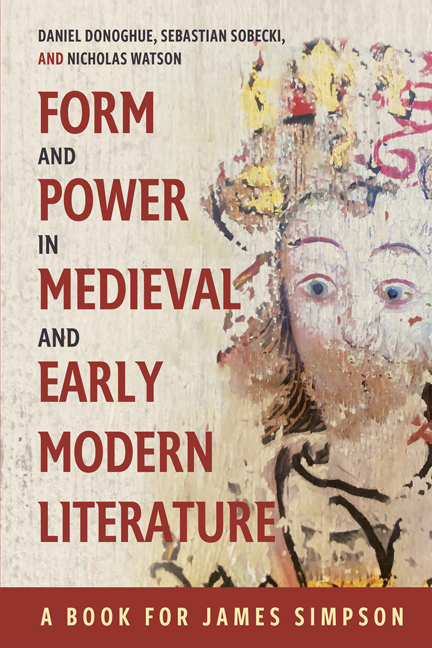Book contents
- Frontmatter
- Contents
- List of Illustrations
- Contributors and Editors
- Acknowledgments
- List of Abbreviations
- Simpson: An Interim Report
- PART I THE HERMENEUTICS OF RECOGNITION
- PART II GENRE AND FIGURE
- PART III CULTURE AND INSTITUTIONS
- PART IV REFORMATIONS
- James Simpson’s Publications from 1984 to 2024
- Bibliography
- A Note on the Bloomfield Conferences
- General Index
- Tabula Gratulatoria
16 - James Simpson’s Freedoms: An Appreciation
Published online by Cambridge University Press: 17 May 2024
- Frontmatter
- Contents
- List of Illustrations
- Contributors and Editors
- Acknowledgments
- List of Abbreviations
- Simpson: An Interim Report
- PART I THE HERMENEUTICS OF RECOGNITION
- PART II GENRE AND FIGURE
- PART III CULTURE AND INSTITUTIONS
- PART IV REFORMATIONS
- James Simpson’s Publications from 1984 to 2024
- Bibliography
- A Note on the Bloomfield Conferences
- General Index
- Tabula Gratulatoria
Summary
The first time I met James Simpson, I found him in the form of a single printed sentence: If literary history and criticism is, as I believe it should be, ancillary to the complex history of freedoms, then this is a narrative of diminishing liberties.
It happened, I think, sometime in the fall of 2003. I was a young doctoral student in the English Department at Harvard. James had just been hired as the department's new medievalist and was soon to arrive on campus. His Reform and Cultural Revolution had been published a few months before, and everyone said it was supposed to be bodacious stuff: a field-changing, boundary-crossing, nose-tweaking book, a whisper in the ear of early modernists and many others. I liked the sound of that, and I wanted to know what I was in for at the hands of this new teacher. So I bought the book, hauled it over to Widener Library, opened to paragraph one, and found that sentence: If literary history and criticism is, as I believe it should be, ancillary to the complex history of freedoms, then this is a narrative of diminishing liberties.
The thing that startled me, reading that sentence for the first time, was its sheer confidence. I believe, it said. This was a credo, a declaration. This writer had convictions about what literary history and criticism should be. He could name his enterprise in five words: “the complex history of freedoms.” I didn't know exactly what that phrase meant, “the complex history of freedoms.” But I could tell it named something strong enough to give this writer his bearings. Already he had my attention.
He had my attention in part because belief, at that moment, seemed to me especially elusive. I was a working-class Protestant with an ingrained mistrust of established institutions, and I found myself now reading medieval literature at an institution that was very well established indeed. I was skeptical about the whole enterprise, resistant to the possibility that history, or historical scholarship, could make any claims on the business of living in the present. I doubted whether I could honestly say what purpose, truth, or community my own scholarship served.
- Type
- Chapter
- Information
- Form and Power in Medieval and Early Modern LiteratureA Book for James Simpson, pp. 293 - 300Publisher: Boydell & BrewerPrint publication year: 2024

